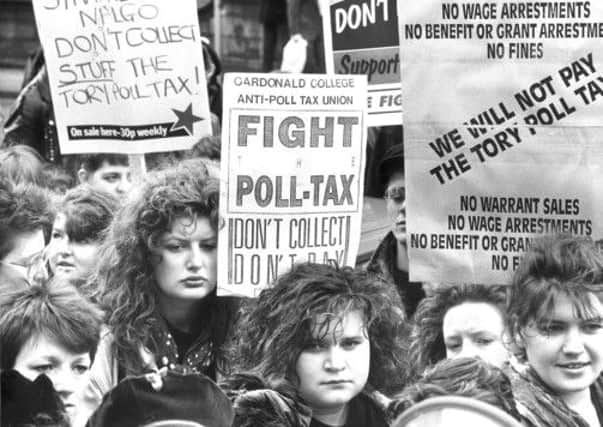Council to track down Scots owing poll tax arrears


Aberdeenshire Council leader Jim Gifford said officers would analyse the Electoral Register to see if anyone listed was due money to the local authority.
Officials have estimated that Scottish councils are still due millions of pounds from the old community charge system, widely referred to as the poll tax.
Advertisement
Hide AdAdvertisement
Hide AdThe controversial Conservative policy was introduced by Margaret Thatcher in Scotland in 1989 and was in place for four years.
It levied a flat fee on everyone who was registered to vote, regardless of income or ability to pay, and prompted many to come off the Electoral Register as part of a widespread wave of civil disobedience across the UK.
Mr Gifford said: “If they don’t pay, we will go after them for that money.
“We don’t ever give up on the money we are owed. Any money we don’t get from people is being paid for by everyone else.”
A senior Conservative councillor in Aberdeen is urging local authorities across the country to claw back arrears from poll tax evaders, many of whom signed up to vote for the first time in decades to take part in this month’s referendum.
Alan Donnelly said the income could provide a welcome boost for cash-strapped authorities faced with an ongoing council tax freeze imposed by the Scottish Government.
He said officials in Aberdeen had estimated that about 1,000 poll tax evaders could still be living in the city.
He said: “We have heard about the so-called missing millions who decided to register to vote in the independence referendum.
Advertisement
Hide AdAdvertisement
Hide Ad“Many of these people fell off the register because of the community charge – the so-called poll tax.
“We could be talking about a significant amount of money in arrears – perhaps up to £250,000.”
Mr Gifford said Aberdeenshire Council’s finance teams had already been tasked with analysing the Electoral Register to check for discrepancies in poll tax and council tax payments.
He said: “We’ve had that discussion with our finance officers: are there are a whole heap of people who appeared on the Electoral Register who were not there before, or for a while?
“We’ll be looking to make sure people are paying the right tax.”
Independent Aberdeenshire councillor Alan Buchan said he believed authorities should go after tax-evaders.
He said: “Resources are tight as it is and everyone should pay their fair share. The shortfall must be made up by someone, otherwise it hits things like schools.”
But opposition SNP councillors from both authorities slammed the proposal to chase 25-year-old debts.
Advertisement
Hide AdAdvertisement
Hide AdAberdeen City Council’s SNP group leader Callum McCaig said: “I think that we are in dangerous territory here.
“Clearly, there is a duty on local authorities to pursue debts, but the fear that will be there for some folk, keeping them from exercising their vote, is bad for democracy and ultimately bad for government at all levels.”
Fraserburgh SNP councillor Brian Topping acknowledged councils had a “duty” to make sure people paid any rent and taxes that were due .
But he said it would be “outrageous” to use the “tremendous” level of interest in the referendum shown by the people of Scotland in such a way.